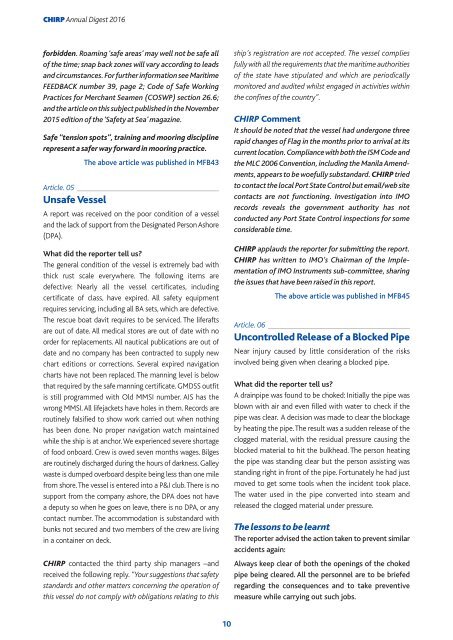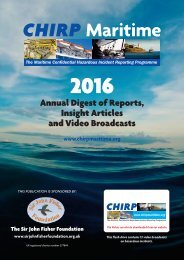CHIRP annual digest 2016 6th
You also want an ePaper? Increase the reach of your titles
YUMPU automatically turns print PDFs into web optimized ePapers that Google loves.
<strong>CHIRP</strong> Annual Digest <strong>2016</strong><br />
forbidden. Roaming ‘safe areas’ may well not be safe all<br />
of the time; snap back zones will vary according to leads<br />
and circumstances. For further information see Maritime<br />
FEEDBACK number 39, page 2; Code of Safe Working<br />
Practices for Merchant Seamen (COSWP) section 26.6;<br />
and the article on this subject published in the November<br />
2015 edition of the ‘Safety at Sea’ magazine.<br />
Safe “tension spots”, training and mooring discipline<br />
represent a safer way forward in mooring practice.<br />
Article. 05<br />
Unsafe Vessel<br />
The above article was published in MFB43<br />
A report was received on the poor condition of a vessel<br />
and the lack of support from the Designated Person Ashore<br />
(DPA).<br />
What did the reporter tell us?<br />
The general condition of the vessel is extremely bad with<br />
thick rust scale everywhere. The following items are<br />
defective: Nearly all the vessel certificates, including<br />
certificate of class, have expired. All safety equipment<br />
requires servicing, including all BA sets, which are defective.<br />
The rescue boat davit requires to be serviced. The liferafts<br />
are out of date. All medical stores are out of date with no<br />
order for replacements. All nautical pub lications are out of<br />
date and no company has been contracted to supply new<br />
chart editions or corrections. Several expired navigation<br />
charts have not been replaced. The manning level is below<br />
that required by the safe manning certificate. GMDSS outfit<br />
is still programmed with Old MMSI number. AIS has the<br />
wrong MMSI. All lifejackets have holes in them. Records are<br />
routinely falsified to show work carried out when nothing<br />
has been done. No proper navigation watch maintained<br />
while the ship is at anchor. We experienced severe shortage<br />
of food onboard. Crew is owed seven months wages. Bilges<br />
are routinely discharged during the hours of darkness. Galley<br />
waste is dumped overboard despite being less than one mile<br />
from shore. The vessel is entered into a P&I club. There is no<br />
support from the company ashore, the DPA does not have<br />
a deputy so when he goes on leave, there is no DPA, or any<br />
contact number. The accommodation is sub standard with<br />
bunks not secured and two members of the crew are living<br />
in a container on deck.<br />
<strong>CHIRP</strong> contacted the third party ship managers –and<br />
received the following reply. “Your suggestions that safety<br />
standards and other matters concerning the operation of<br />
this vessel do not comply with obligations relating to this<br />
ship’s registration are not accepted. The vessel complies<br />
fully with all the requirements that the maritime authorities<br />
of the state have stipulated and which are periodically<br />
monitored and audited whilst engaged in activities within<br />
the confines of the country”.<br />
<strong>CHIRP</strong> Comment<br />
It should be noted that the vessel had undergone three<br />
rapid changes of Flag in the months prior to arrival at its<br />
current location. Compliance with both the ISM Code and<br />
the MLC 2006 Convention, including the Manila Amend -<br />
ments, appears to be woefully substandard. <strong>CHIRP</strong> tried<br />
to contact the local Port State Control but email/web site<br />
contacts are not functioning. Investigation into IMO<br />
records reveals the government authority has not<br />
conducted any Port State Control inspections for some<br />
considerable time.<br />
<strong>CHIRP</strong> applauds the reporter for submitting the report.<br />
<strong>CHIRP</strong> has written to IMO’s Chairman of the Imple -<br />
mentation of IMO Instruments sub-committee, sharing<br />
the issues that have been raised in this report.<br />
The above article was published in MFB45<br />
Article. 06<br />
Uncontrolled Release of a Blocked Pipe<br />
Near injury caused by little consideration of the risks<br />
involved being given when clearing a blocked pipe.<br />
What did the reporter tell us?<br />
A drainpipe was found to be choked: Initially the pipe was<br />
blown with air and even filled with water to check if the<br />
pipe was clear. A decision was made to clear the blockage<br />
by heating the pipe. The result was a sudden release of the<br />
clogged material, with the residual pressure causing the<br />
blocked material to hit the bulkhead. The person heating<br />
the pipe was standing clear but the person assisting was<br />
standing right in front of the pipe. Fortunately he had just<br />
moved to get some tools when the incident took place.<br />
The water used in the pipe converted into steam and<br />
released the clogged material under pressure.<br />
The lessons to be learnt<br />
The reporter advised the action taken to prevent similar<br />
accidents again:<br />
Always keep clear of both the openings of the choked<br />
pipe being cleared. All the personnel are to be briefed<br />
regarding the consequences and to take preventive<br />
measure while carrying out such jobs.<br />
10



